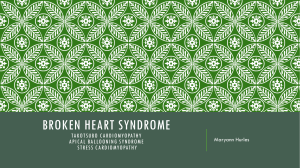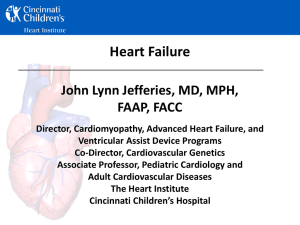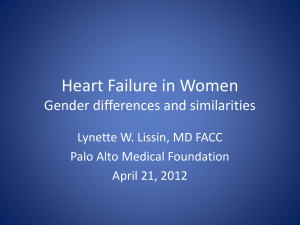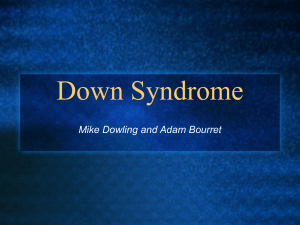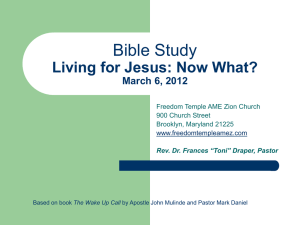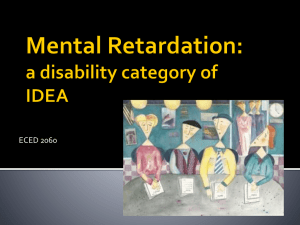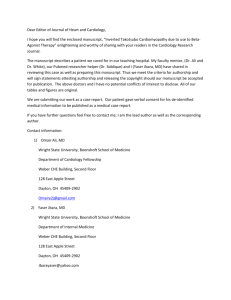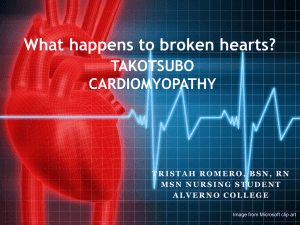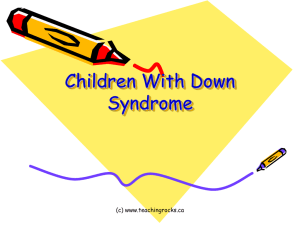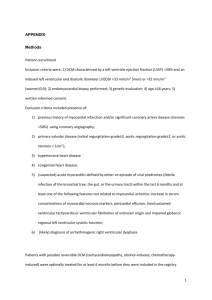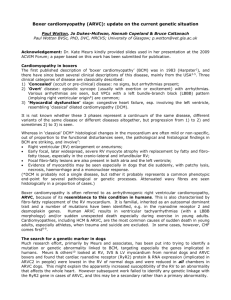Emotional Pain Affects the Heart -
advertisement
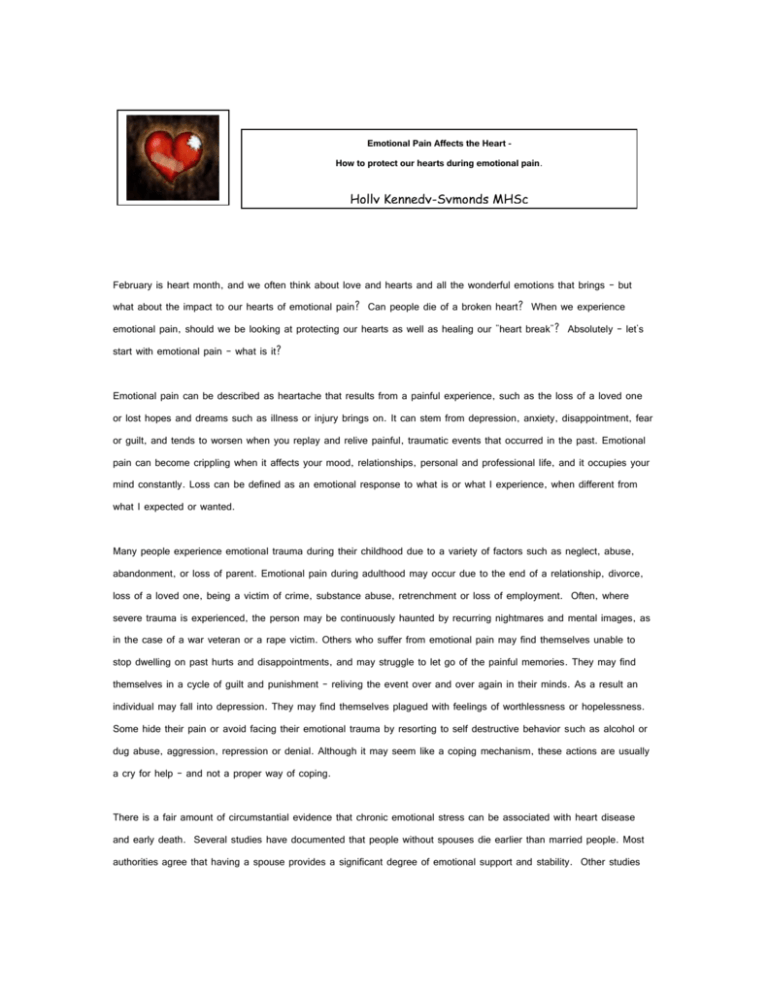
Emotional Pain Affects the Heart How to protect our hearts during emotional pain. Holly Kennedy-Symonds MHSc February is heart month, and we often think about love and hearts and all the wonderful emotions that brings - but what about the impact to our hearts of emotional pain? Can people die of a broken heart? When we experience emotional pain, should we be looking at protecting our hearts as well as healing our "heart break"? Absolutely - let's start with emotional pain - what is it? Emotional pain can be described as heartache that results from a painful experience, such as the loss of a loved one or lost hopes and dreams such as illness or injury brings on. It can stem from depression, anxiety, disappointment, fear or guilt, and tends to worsen when you replay and relive painful, traumatic events that occurred in the past. Emotional pain can become crippling when it affects your mood, relationships, personal and professional life, and it occupies your mind constantly. Loss can be defined as an emotional response to what is or what I experience, when different from what I expected or wanted. Many people experience emotional trauma during their childhood due to a variety of factors such as neglect, abuse, abandonment, or loss of parent. Emotional pain during adulthood may occur due to the end of a relationship, divorce, loss of a loved one, being a victim of crime, substance abuse, retrenchment or loss of employment. Often, where severe trauma is experienced, the person may be continuously haunted by recurring nightmares and mental images, as in the case of a war veteran or a rape victim. Others who suffer from emotional pain may find themselves unable to stop dwelling on past hurts and disappointments, and may struggle to let go of the painful memories. They may find themselves in a cycle of guilt and punishment - reliving the event over and over again in their minds. As a result an individual may fall into depression. They may find themselves plagued with feelings of worthlessness or hopelessness. Some hide their pain or avoid facing their emotional trauma by resorting to self destructive behavior such as alcohol or dug abuse, aggression, repression or denial. Although it may seem like a coping mechanism, these actions are usually a cry for help – and not a proper way of coping. There is a fair amount of circumstantial evidence that chronic emotional stress can be associated with heart disease and early death. Several studies have documented that people without spouses die earlier than married people. Most authorities agree that having a spouse provides a significant degree of emotional support and stability. Other studies have shown fairly conclusively that people who have had recent major life changes (loss of a spouse or other close relative, loss of a job, moving to a new location) have a higher incidence of death. People who are quick to anger or who display frequent hostility have an increased risk of heart disease. Broken heart syndrome is commonly blamed for the death of a person whose spouse is already deceased, but the cause is not always so clear-cut. The condition can be triggered by sudden emotional stress caused by a traumatic breakup, the death of a loved one, or even the shock of a surprise party (1). Broken Heart syndrome is clinically different from a heart attack because the patients have few risk factors for heart disease and were previously healthy prior to the heart muscles weakening. The recovery rates for those suffering from "broken heart syndrome" are faster than those who had heart attacks and complete recovery to the heart was achieved within two weeks. (2) Broken Heart Syndrome has another name: Takotsubo cardiomyopathy, or transient apical ballooning syndrome, apical ballooning cardiomyopathy, stress-induced cardiomyopathy, and simply stress cardiomyopathy. It is a type of nonischemic cardiomyopathy in which there is a sudden temporary weakening of the myocardium (the muscle of the heart). This weakening can be triggered by emotional stress, such as the death of a loved one, so the condition is also known as broken heart syndrome. (3) The typical presentation of someone with takotsubo cardiomyopathy is a sudden onset of congestive heart failure or chest pain associated with cardiogram changes suggestive of an anterior wall myocardial infarction (heart attack). During the course of evaluation of the patient, a bulging out of the left ventricular apex with a hypercontractile base of the left ventricle is often noted. (4). It is the hallmark bulging out of the apex of the heart with preserved function of the base that earned the syndrome its name "tako tsubo", or octopus trap in Japan, where it was first described. The cause appears to involve high circulating levels of catecholamines (mainly adrenaline/epinephrine). Evaluation of individuals with takotsubo cardiomyopathy, typically include a coronary angiogram, which will not reveal any significant blockages that would cause the left ventricular dysfunction. Provided that the individual survives their initial presentation, the left ventricular function improves within 2 months. Takotsubo cardiomyopathy is more commonly seen in post-menopausal women. Often there is a history of a recent severe emotional or physical stress. Cause is unknown, but likely there are multiple factors at play which include some amount of vasospasm, failure of the microvasculature, and an abnormal response to catecholamines (such as epinephrine and norepinephrine), released in response to stress. The treatment of takotsubo cardiomyopathy is generally supportive in nature. In individuals with low blood pressure, support with inotropic agents or an intra-aortic balloon pump have been used. In many individuals, left ventricular function normalizes within 2 months. Aspirin and other heart drugs also appear to help in the treatment of this disease, even in extreme cases. Despite the grave initial presentation in some of the patients, most of the patients survive the initial acute event, with a very low rate of in-hospital mortality or complications. Patients are expected to make a favorable recovery once past the acute stage of the syndrome, and the long-term prognosis is excellent. (5) Even when ventricular systolic function is heavily compromised at presentation, it typically improves within the first few days and normalises within the first few months. Not all emotional stress is bad. A sense of loss of control appears to be a particularly important form of emotional stress. Furthermore, this evidence seems to confirm that if some sense of control over one’s destiny is maintained, stress can be exhilarating rather than debilitating. Stress management programs often consist of breathing exercises, stretching exercises, Yoga, meditation, and/or massage. There are probably several useful approaches, but they all aim toward the same goal – to blunt the adrenaline response to minor stress. Essentially, new responses need to be learned, so that the fight-or-flight adrenaline surge is not automatically engaged at the first sign of trouble. Stress management programs have begun to demonstrate some success in accomplishing this end. A recent study from Duke University (6) reported a significant reduction in heart attacks among patients with coronary artery disease who underwent a formal stress management program, which was used in conjunction with a smoking cessation program, a weight-loss program, and control of lipids. And finally, it should be pointed out that exercise is a great way of reducing chronic stress, and in addition has the advantage of directly lessening the risk of coronary artery disease, and helping to control obesity. There are effective ways of coping through emotional pain and letting go of the traumas of the past. Dealing directly with your emotions and acknowledging emotional trauma is the first step to healing. Treatments that aim to help you claim your life back and put things into perspective include: counseling and psychotherapy, cognitive behavioral therapy, meditation and spiritual therapy. What is broken? - my heart, not my head. Use your knowledge to take the time to understand your responses to loss, patterns of comfort that are helpful from those that are not and L.I.V.E. to heal from emotional pain: L - listen I - identify V - validate E - evaluate If you take responsibility for healing from emotional pain, you will not live as a victim of circumstances and continue to hurt. Victims have no personal power. When you feel, identify, and process, you can choose to act on truth and heal. Then you can experience the present moment, abundant life and living. Emotional pain can get us rehashing moments and reliving experiences, so they become part of our present, even though they occurred in the past. If we allow this, our past can drive our future. We can even be distracted by these thoughts, so we miss out on the present and negatively affect our future. Work through the past, but be fully present in the now, with your family, friends and co-workers and create your new future. Be the author of your destiny. References: "Study Suggests You Can Die of a Broken Heart". Washington Post. February 10, 2005. 1. http://www.washingtonpost.com/wp-dyn/articles/A11446-2005Feb9.html. 2. Broken Heart” Syndrome: Real, Potentially Deadly but Recovery Quick". Johns Hopkins Medicine. February 9, 2005. http://www.hopkinsmedicine.org/Press_releases/2005/02_10_05.html. Retrieved 2006-09-23. 3. Mayo Clinic Research Reveals 'broken Heart Syndrome' Recurs In 1 Of 10 Patients Mayo Clinic Research Reveals 'broken Heart Syndrome' Recurs In 1 Of 10 PatientsArticle adapted by Medical News Today from original press release, 16 Nov 2006 - 22:00 PDT. 4. Takotsubo Cardiomyopathy, or Broken-Heart Syndrome. , Salim S. Virani, MD, A. Nasser Khan, MD, Cesar E. Mendoza, MD, Alexandre C. Ferreira, MD, and Eduardo de Marchena, MDTex Heart Inst J. 2007; 34(1): 76–79. 5. The"Broken Heart Syndrome": Understanding Takotsubo Cardiomyopathy, Dawn Derrick, MSN Critical Care Nurse. 2009;29: 49-57 6. Fogoros, R.N. Does Stress Really Cause Heart Disease? Nov 30, 2009 in About.com: Heart Disease. Holly Kennedy-Symonds works as a Clinical Nurse Specialist for the Fraser Health Regional Cardiac Services Program.
